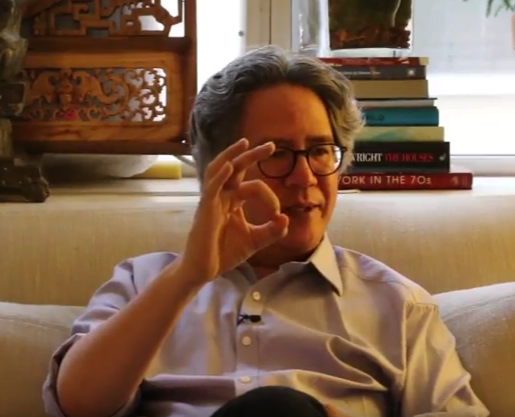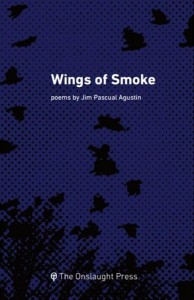Light and darkness as depicted in Jim Pascual Agustin’s ‘Wings of Smoke’
By Marius Carlos, Jr.The most striking aspect of Jim Pascual Agustin’s new book of poetry, “Wings of Smoke,” is its natural flair for vivid contrasts, with each line retaining its power as each poem rears and strikes repeatedly, until the final set of images are unleashed.
stretching the fabric
stretching the fabric is a struggle to recollect and reconnect, to recuperate the living parts of distant memories.
“Open Air Cinema in the Rain” calibrates the present, through the approximation of movement and emotion. The progression of the “I” as it moves from godly to all too human creates an almost painful conclusion: that all things eventually succumb to the darkness of evening. Agustin pointedly plays with light and darkness throughout his book, perhaps in an effort to situate his readers in the then and now while secretly removing the illusory boundary between the two.
“Bladed Spurs,” another spectacle-cored piece, presents an almost displaced recollection of cockfighting – the voice trails off toward the end:
The rooster’s heart
against my hands,
the burning heat of its skin
beneath feathers
with a metallic shine.
shadows the shape of knives
shadow the shapes of knives hits the ground running with “Ghost Train,” a cleverly disguised piece that positions the ghost (the lost person) as a breathing memory that wishes to return (home). A train is unstoppable – like most things in life. It is only in poetry that trains relinquish their monstrous power to the even more murderous power of ink and paper.
As I have observed earlier, Agustin has chosen light and darkness as the main principles of creation in “Wings of Smoke.” The book began with the poem “Open Air Cinema in the Rain” and as the poet crosses to “Bamboo” in section two, the mood begins to darken, while maintaining the necessary inconsistency in the visual depiction of light/darkness.
Consider the lines “They break into the light/to put out slender/spikes that turn vivid/green. One by one” and the logical final blow “I’ve dug them out/many times, tearing off/the roots of our own/plants in futility.”

Jim Pascual Agustin grew up in the Philippines during the reign of the late dictator, Ferdinand Marcos. Agustin moved to Cape Town, South Africa in 1994. His first book, “Beneath an Angry Star,” was published in 1992 by Anvil Publishing. In South Africa, his poetry has won the DALRO Award for poetry second prize as well as the Sol Plaatje EU Poetry Award 3rd Prize in 2014 and 2015. His blog can be found on www.matangmanok.wordpress.com.
wings of smoke
The third section, wings of smoke, gives this reader a sense of fragmentation, loss, of slowing down and at the same time, blinding flashes of urgency. While this is the general feel of the section, Agustin calmly sends shockwaves as the text lulls readers with slow-moving life and less than stellar imagery. A case in point would be “Inspired Weeping” and I quote: “faces in the crowd/like unwrung clothes in winter/strangers paid to mourn.”
In retrospect, the sudden loss of the cinematic pulse in the third section makes complete sense: for evening has already passed in shadows the shape of knives and the text is now gently moving in and out of consciousness in the blackness of midnight.
a blanket over each cage
The fourth section, a blanket over each cage, presents a completely revitalized sense of poetics (waking up in the morning!) with a distinct sound and cadence that crosses over from merely a hint of cinema to fiction crossed with poetry. “The Feather Could Be Yours Someday” creates an upheaval in the tonality of the book, bringing the clearest message that toes the line of morality – a undeniable sign of committed writing on the part of Agustin. The lines “these neighbors deal/in exotic birds. Clearly/a blanket over each cage/is not enough/to trick the senses” exemplify the author’s contextualization of his work in the here and the now.
Paranoia, often hidden in most works of literature, is catapulted and rendered in the mechanistic world of “Armed Response.” This piece presents a more clipped verse structure (mono-robotic), peppered with the militaristic air of the day: humming, precision, red, eyes, high voltage, space, etc. “Armed Response” illustrates the indefatigable connection between technologies of control and the inability of man to match its own machines.
***
One way or another, “Wings of Smoke” is every one of us in certain decades, years or weeks of our lives. And whether you like it or not, your cinematic heartbeat fades too, as darkness covers the land of the unfree.
Marius Carlos, Jr. is an editor, essayist and fiction writer. His critical essays and reviews have appeared in national publications like the Philippines Graphic, Manila Times, Business Mirror, and Reader’s Digest SEA.













[…] Thank you to Marius Carlos, Jr for this review with two versions. One appears on his Medium.com page. The other version appears on The FilAm. […]